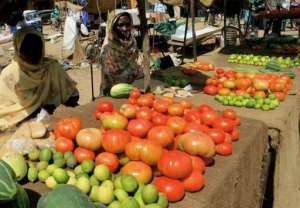
KHARTOUM (AFP) - Sudanese lawyers joined on Sunday a widening protest movement against high prices under the 23-year-old regime of President Omar al-Bashir, witnesses said.
The lawyers took to the streets near the courthouse in El Obeid, capital of North Kordofan state, where some were arrested, the witnesses said.
Separately, about 100 students from a local university in El Obeid also protested and called for the downfall of the regime, while other demonstrators gathered in the town's main market, the witnesses said.
Police responded with tear gas and batons, they added, in what has become the standard reaction by security forces since demonstrations began on June 16 in the capital Khartoum.
The protests over rising prices started with students outside the University of Khartoum, but broadened to include a cross-section of the population in numerous locations throughout the capital, and several other parts of the country.
Bashir, an army officer who seized power on June 30, 1989, withstood earlier student-led protests by thousands of people objecting to high prices in 1994.
Though smaller in size, the current protests have occurred continuously for nine days, with citizens burning tyres and throwing stones at police.
Khartoum itself was relatively quiet on Sunday but riot police stood guard and blocked a main street near the University of Khartoum, an AFP reporter said.
State security officers ordered one of Sudan's main opposition parties, Umma, not to hold any public forums at its headquarters, a party leader said.
"We are going to discuss this in our political bureau and decide what do do," the party's general secretary, Ibrahim Al Amin, told AFP.
Hundreds of people attended a forum over food prices at Umma's offices last week before their attempt to demonstrate was met with police tear gas.
Inflation has risen each month, hitting 30.4 percent in May, before Finance Minister Ali Mahmud al-Rasul on Wednesday announced the scrapping of fuel subsidies, causing a jump of about 50 percent in the price of petrol.
Bankrupt Sudan has lost billions of dollars in oil receipts since South Sudan gained independence last July leaving the north struggling for revenue, plagued by inflation, and with a severe shortage of dollars to pay for imports.
The country's poverty rate is 46.5 percent, the United Nations says.
Sudan's demonstrations, however, remain small compared with mass uprisings that swept some Middle East countries last year as part of the Arab Spring protests.




 Western North been sidelined for far too long; address our needs before 2024 ele...
Western North been sidelined for far too long; address our needs before 2024 ele...
 Effutu: 'Stop eating at night and take care of your health' — Afenyo Markin advi...
Effutu: 'Stop eating at night and take care of your health' — Afenyo Markin advi...
 Akufo-Addo's desperate attempt to disrupt Yagbonwura's 1st year anniversary cele...
Akufo-Addo's desperate attempt to disrupt Yagbonwura's 1st year anniversary cele...
 Armed robbers attack, rob Sethi Brothers Ghana Limited in Tema
Armed robbers attack, rob Sethi Brothers Ghana Limited in Tema
 SML deal: We commend Manasseh for holding gov't to account, Akufo-Addo for not s...
SML deal: We commend Manasseh for holding gov't to account, Akufo-Addo for not s...
 Our recall invocation is in good faith to consider three key issues – Majority
Our recall invocation is in good faith to consider three key issues – Majority
 You’re inviting bad luck upon yourself if you use Indian hair — Spiritualist war...
You’re inviting bad luck upon yourself if you use Indian hair — Spiritualist war...
 Ejisu by-election: Police questions Kwadaso MP, two others over bribery allegati...
Ejisu by-election: Police questions Kwadaso MP, two others over bribery allegati...
 Nana Kwame Bediako is Nkrumah’s reincarnate; he’ll be president if he appoints N...
Nana Kwame Bediako is Nkrumah’s reincarnate; he’ll be president if he appoints N...
 Dumsor: Mahama gave us ‘dum, dum, dum’ but we are now in the era of ‘dum sie sie...
Dumsor: Mahama gave us ‘dum, dum, dum’ but we are now in the era of ‘dum sie sie...
